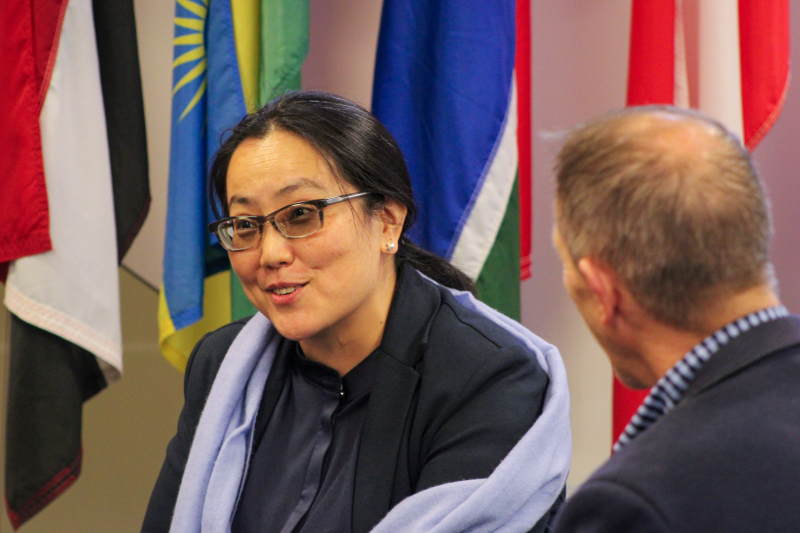-

Hear from Professor Monica Toft
Learn how Professor Monica Toft is shaping the study of global affairs and diplomacy at Fletcher.
Hear from Prof. Toft -

Explore Fletcher academics in action
Fletcher Features offers insights, innovation, stories and expertise by scholars.
Get global insights -
Get application tips right from the source
Learn tips, tricks, and behind-the-scenes insights on applying to Fletcher from our admissions counselors.
Hear from Admissions -

Research that the world is talking about
Stay up to date on the latest research, innovation, and thought leadership from our newsroom.
Stay informed -
Meet Fletcherites and their stories
Get to know our vibrant community through news stories highlighting faculty, students, and alumni.
Meet Fletcherites -

Forge your future after Fletcher
Watch to see how Fletcher prepares global thinkers for success across industries.
See the impact -

Global insights and expertise, on demand.
Need a global affairs expert for a timely and insightful take? Fletcher faculty are available for media inquiries.
Get in Touch
Appreciation for Divergent Points of View
From communist Mongolia to the pedagogical power of a doughnut, Ariunaa Batbold F01 draws on a lifetime of experience in her career in international finance

Throughout her career, Ariunaa Batbold F01 has followed her curiosities surrounding international affairs, starting with her first job. Batbold grew up in communist Mongolia, and her early work as a translator exposed her to different ways of seeing the world.
“After college, I worked as a translator with a number of international development organizations such as The World Bank and IMF in the mid 1990s,” said Batbold. “At the time, Mongolia was transitioning from a state-run economy to a market-based economy after the collapse of the Soviet Union.”
Through her role as an interpreter, she met leading international economists and experts who urged her to pursue a graduate degree abroad. This encouragement helped her realize that navigating through an increasingly globalized world required strong intercultural and interdisciplinary skills, which a master’s degree in international relations could provide.
Finding a Home in Boston
As Batbold began to explore options for graduate study in international relations in the United States, her professional contacts pointed her to The Fletcher School.
“The technical consultants I worked with mentioned Fletcher to me,” she said. “I passed the Fletcher campus while visiting a relative in Boston and started learning more about it. During my research, I came across the Master of Arts in Law and Diplomacy (MALD) degree Fletcher offered, which gave students opportunities to engage in a broad spectrum of subjects with an outstanding faculty group.”
“I felt it was a great fit for me coming from a non-western education system that provided a more regimented educational experience,” she added. “The opportunities offered by the MALD program meant that I could build a strong foundation while exploring which particular area I would focus on later in my studies.”
As a student, she quickly felt at home among Fletcher’s close-knit community.
“Mongolia is a very homogenous society, and suddenly you meet people of all different races and ethnicities – for me, that was really great,” said Batbold. “The fact that they never questioned me as an outsider made me feel very welcome.”
“Medford was very idyllic,” she added. “I felt surrounded by a lot of young people, and it was very easy to get around. I couldn’t drive, but there was the subway system and buses, so it felt easy for me.”
Applying New Perspectives to International Problems
Today, Batbold serves as the managing director of Cerberus Frontier, a capital management firm in Singapore. In her work, she enjoys assessing multidimensional problems with cross-border elements and interdependencies.
“When I think about the Fletcher experience, sometimes it's not those nitty-gritty, minute details that matter,” she said. “It shapes you to think in a certain way. For me, being with so many different backgrounds and different people taught me to be open-minded and remember that something that you think is right could be wrong from another person's perspective.”
An emblematic example of this Fletcher point of view came from a class discussion on an unexpected topic: doughnuts.
“If you want people to describe a doughnut, they’re all going to have a different perspective,” she said. “Someone will say it’s round, or that it has a hole in it. Or that it's a snack, a dessert or a bread.”
“People will say different things,” she added. “They're all going to be right, but they're all looking at it from different viewpoints and positions. That has been so fundamental to me. Even if you have a deep conviction that you're 100% right, there's no such thing as 100% right. Having a flexible mindset is very important.”
Read more about Fletcher’s Master of Arts in Law and Diplomacy degree program.

